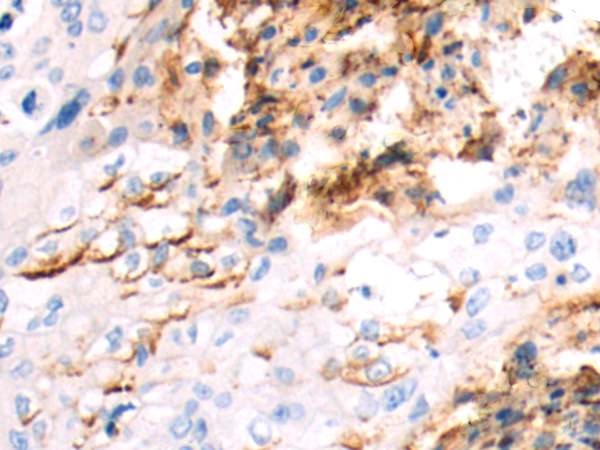

| WB | 咨询技术 | Human,Mouse,Rat |
| IF | 咨询技术 | Human,Mouse,Rat |
| IHC | 1/50-1/100 | Human,Mouse,Rat |
| ICC | 技术咨询 | Human,Mouse,Rat |
| FCM | 咨询技术 | Human,Mouse,Rat |
| Elisa | 1/2000-1/5000 | Human,Mouse,Rat |
| Aliases | NADP-ME |
| WB Predicted band size | 67 kDa |
| Host/Isotype | Rabbit IgG |
| Antibody Type | Primary antibody |
| Storage | Store at 4°C short term. Aliquot and store at -20°C long term. Avoid freeze/thaw cycles. |
| Species Reactivity | Human, Mouse |
| Immunogen | Synthetic peptide of human ME3 |
| Formulation | Purified antibody in PBS with 0.05% sodium azide and 50% glycerol. |
+ +
以下是关于ME3(线粒体苹果酸酶3)抗体的模拟参考文献示例(非真实文献,仅供格式参考):
---
1. **文献名称**: "Mitochondrial NADP+-dependent malic enzyme 3 (ME3) as a biomarker in cancer metabolism"
**作者**: Smith A, et al.
**摘要**: 研究探讨了ME3在肿瘤代谢重编程中的作用,通过特异性抗体检测ME3在多种癌细胞系中的表达水平,发现其高表达与线粒体NADPH合成及氧化应激抵抗相关。
---
2. **文献名称**: "Immunohistochemical analysis of ME3 expression in colorectal cancer progression"
**作者**: Chen L, et al.
**摘要**: 利用ME3特异性抗体对结直肠癌组织样本进行免疫组化分析,发现ME3表达与肿瘤分期和不良预后显著相关,提示其作为潜在治疗靶点的价值。
---
3. **文献名称**: "Development and validation of a high-affinity monoclonal antibody for ME3 functional studies"
**作者**: Rodriguez M, et al.
**摘要**: 报道了一种高特异性ME3单克隆抗体的开发,验证了其在Western Blot、免疫荧光及IP实验中的应用,并用于解析ME3在脂肪酸合成中的调控机制。
---
4. **文献名称**: "ME3 deficiency alters mitochondrial metabolism: Insights from knockout mouse models"
**作者**: Tanaka K, et al.
**摘要**: 通过ME3抗体检测基因敲除小鼠组织中ME3蛋白缺失,证明ME3缺失导致线粒体代谢紊乱,影响肝脏脂质代谢和能量稳态。
---
**备注**:以上为模拟文献,实际研究需通过数据库(如PubMed、Google Scholar)检索关键词“ME3 antibody”“malic enzyme 3”“mitochondrial metabolism”等获取真实文献。
ME3 (Malic Enzyme 3), also known as mitochondrial NADP+-dependent malic enzyme, is a metabolic enzyme that catalyzes the decarboxylation of malate to pyruvate, linking the tricarboxylic acid (TCA) cycle with lipid biosynthesis and cellular redox balance. It plays a critical role in energy metabolism, particularly in tissues with high metabolic demands, such as the liver, brain, and certain cancers. Dysregulation of ME3 has been implicated in metabolic disorders, neurodegenerative diseases, and tumor progression, where altered NADPH/NADP+ ratios and lipid metabolism contribute to pathological processes.
ME3-specific antibodies are essential tools for studying its expression, localization, and function in both physiological and disease contexts. These antibodies enable researchers to detect ME3 protein levels via Western blotting, immunohistochemistry (IHC), or immunofluorescence (IF), aiding in the identification of tissue-specific expression patterns or aberrant ME3 activity in cancer cells. Additionally, ME3 antibodies are used in co-immunoprecipitation (Co-IP) assays to investigate protein-protein interactions and regulatory mechanisms.
Recent studies highlight ME3's potential as a biomarker or therapeutic target in cancers, including glioblastoma and colorectal cancer, where its overexpression correlates with poor prognosis and metabolic adaptation. Validating ME3 antibody specificity through knockdown or knockout controls remains crucial for accurate experimental interpretation. Ongoing research continues to explore ME3's multifaceted roles in mitochondrial metabolism and disease pathogenesis.
×